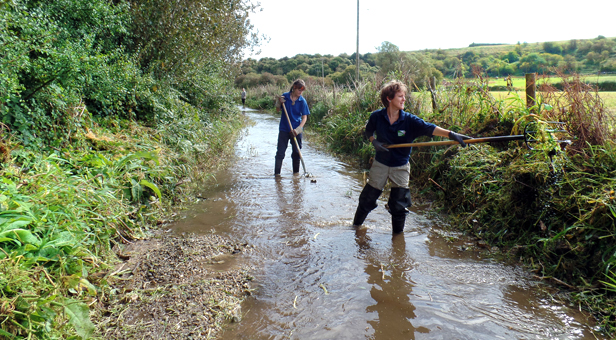
DWT staff and volunteers clearing weed on the Gussage Stream © Sally Welbour
A group of 120 volunteers and staff from Dorset Wildlife Trust (DWT) and Sembcorp Bournemouth Water have put in 600 hours of work to clear the Gussage Stream near Wimborne of 2km (1.5miles) of weed and vegetation to support rare and threatened wildlife, such as otters and white-clawed crayfish.
The work also compliments the Environment Agency and Sembcorp’s work with how they manage flows in the future, and explores innovative ways of managing the Gussage Stream in partnership with others and in a wildlife friendly manner. This is the first year ‘man-power’ has been used to clear the stream, whereas in previous years the work was done by machinery, such as an excavator, to remove the excess growth with a long reach bucket.
DWT Rivers Conservation Officer, Amanda Broom, said, “Using machinery to clear the weeds in the stream isn’t the most sensitive method for wildlife, so we are delighted that in partnership with the Environment Agency and with the help of DWT and Sembcorp volunteers, we have been able to cut the weed by hand. Whilst some of the weed is essential for invertebrates and fish, too much can change oxygen levels in the water, causing stress and even fatalities to fish. The Gussage stream is a tributary of the River Allen which is a rare chalk stream, so it is essential that we look after this precious habitat.”
Sembcorp Bournemouth Water has been a long term supporter of DWT’s River Allen project, generously donating annually to conservation work. To find out more about river conservation work in Dorset, visit www.dorsetwildlifetrust.org.uk/dorsetwildrivers.
If you are interested in getting involved with Dorset Wildlife Trust’s volunteering scheme, visit www.dorsetwildlifetrust.org.uk/volunteering






